 Adel Borghei spent Saturday at the United States Open, inside Louis Armstrong Stadium, clad in the navy blue uniform of a referee. He wore sunglasses and made line calls and blended into the background, even if this was far from a normal day at work.
Adel Borghei spent Saturday at the United States Open, inside Louis Armstrong Stadium, clad in the navy blue uniform of a referee. He wore sunglasses and made line calls and blended into the background, even if this was far from a normal day at work.United States sanctions against Iran had prevented Borghei, 32, from working at the tournament, and as the first week of the Open neared a conclusion Friday, he looked into booking a return trip to Iran. He figured his appeal would take too long. He did not expect to work this Open.
Four hours later, the United States Tennis Association called. The appeal had been approved. Borghei could then do what he came to do: work, and without worrying about politics.
I feel I am part of the team now, he said in an interview Saturday on the grounds. That story is done. Now Im looking forward to the next day. I have to do a good job here.
Borghei received confirmation of his employment at the Open in May, obtained a visa and worked at several tournaments all over the world before he arrived in the United States. While in Montreal for the Rogers Cup, he received an e-mail from United States Open officials in which they said current United States law prohibited them from retaining the services of a resident of Iran.
Borghei waited in Florida, in limbo. Two Washington lawyers, Clif Burns of Bryan Cave and Farhad Alavi of Akrivis Law Group, agreed to work together at no cost on his behalf after The New York Times published an article about Borgheis circumstances Aug. 21.
The lawyers appealed to the Office of Foreign Assets Control, which is part of the United States Treasury Department, to obtain what is called a specific license, which would allow Borghei to referee at this Open. He arrived in New York last Monday and waited.
He visited the Statue of Liberty. He waited. He went to Rockefeller Center. He waited. He ascended the Empire State Building. He waited.
The tennis federation in Iran tried to help. So did friends. Finally, by noon Friday, Borghei was ready to give up. He called an airline. Then his phone buzzed.
Youre in, he said the U.S.T.A. official told him. You can come.
He drew a show court assignment on Armstrong and was a line judge for a match between Maria Kirilenko of Russia and Simona Halep of Romania (Halep won).
When he stepped on court, Borghei said, he attempted to banish any thoughts of sanctions or politics or his ordeal of the past week. He focused on his job, on the lines, and nothing else.
Asked if he missed any calls, he laughed. No. Not Saturday.
Alavi, who learned about Borgheis case when he was contacted by a Times reporter, had not faulted the Open for its original reading of the United States sanctions, an interpretation he described as a strict reading of applicable laws. He, too, did not expect the appeal to be expedited. He said it was the quickest turnaround he had seen for a case like this in more than seven years at his current practice.
For Alavi, the most important component here was that Borghei be allowed to work. But the way his case unfolded could have more far-reaching implications, Alavi added.
An exchange like this can definitely help relations, he said. The more issues like this come to light, the more it highlights how these sanctions can impact individuals, the unintended consequences. This is a positive step forward. Reason won the day.
Now, Borghei can add the United States Open to his résumé. He is currently a bronze-badge-rated chair umpire and a silver-badge-rated referee (gold is the highest rating for both).
After the Open, Borghei plans to head back to Iran and take a break. He has been on the road all summer. He declined Saturday to discuss politics. He had to get back to work.
By The New York Times
The Iran Project is not responsible for the content of quoted articles.











